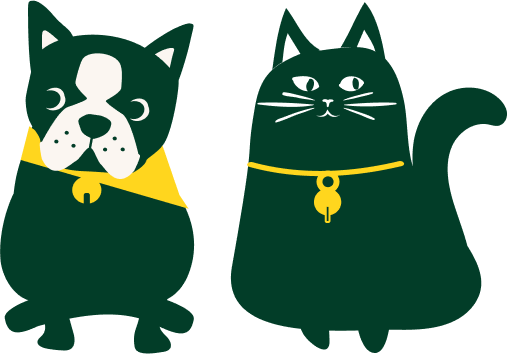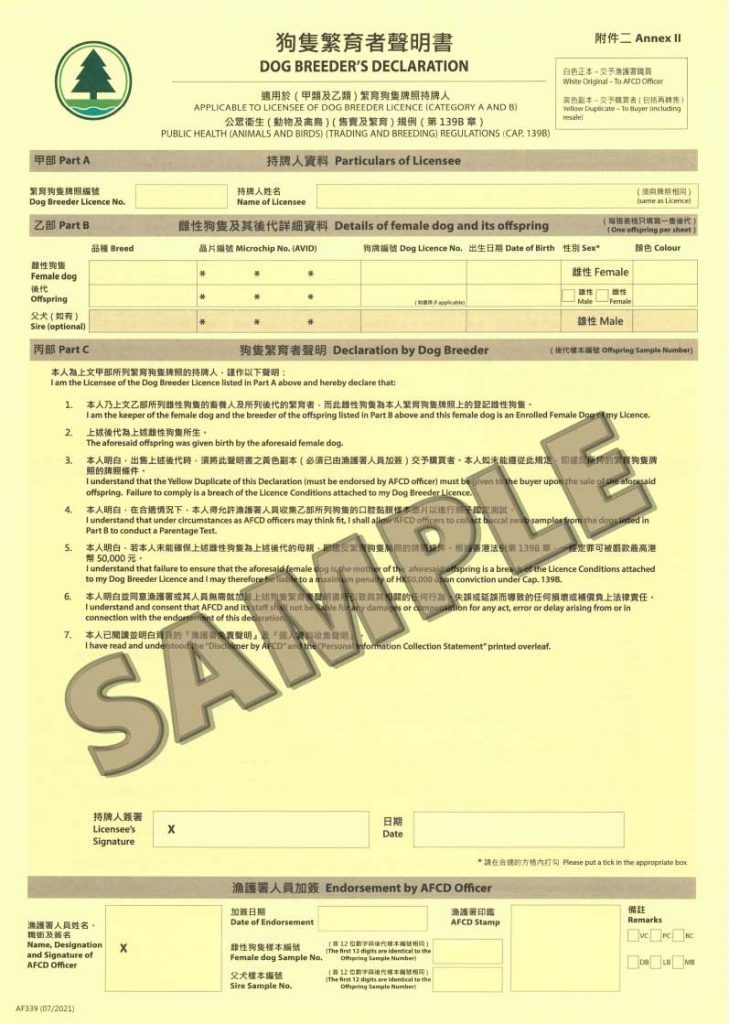Before buying a pet, ask these questions!
Animal trader licence
What the buyer should ask
Ask the seller to show the Animal Trader Licence (ATL).
Correct response from a licensed seller
Licensing requirements require licensed sellers to display the relevant licence on the premises. You can call the Agriculture, Fisheries and Conservation Department at 2150 7077 to verify the validity of the licence or permit.
(Further reading: What types of licences are there for animal trading?)
9-digit microchip in AVID format
What the buyer should ask
Confirm with the seller that the cat has been implanted with a microchip and ask to scan the microchip number.
Correct response from a licensed seller
The licence requires that cats sold by licensed sellers on the premises must be implanted with a 9-digit microchip in the AVID format: (i.e. AVID *XXX*XXX*XXX) by a registered veterinarian. A scanner must also be available on the premises to allow buyers to verify the microchip information.
The vaccination records, deworming, treatment records and receipts that the seller has to provide must all contain the microchip number of the cat being sold.
Age and breed
What the buyer should ask
Request that the seller confirm the age, breed, and gender of the cat.
Correct response from a licensed seller
Besides verifying the cat’s age, breed, and gender, licensing requirements mandate that cats for sale must be at least 10 weeks old.
Vaccination, deworming and treatment records
What the buyer should ask
Ask the seller to provide vaccination, deworming and medical records from a registered veterinarian.
Correct response from a licensed seller
The licence requires licensed sellers to provide original vaccination records, deworming and medical records, which must clearly indicate the breed and age of the cat.
(Further reading: How to tell whether a pet vaccination card is authentic or fake)
Proof of legal origin of the cat
What the buyer should ask
It is best to check with the seller for documentation proving the cat’s origin.
Correct response from a licensed seller
If the cat is imported, it must be accompanied by a health certificate issued by the place of export and a special permit issued by the Agriculture, Fisheries and Conservation Department;
If the cat is from a local source, you can ask for the invoice issued by a previous licensed seller, or the contact information of the original owner.
Neutered or not (not required by law)
Correct response from a licensed seller
Can check with the seller if the cat has been neutered (if applicable).
Correct response from a licensed seller
It is best for licensed sellers to answer whether the cat has been neutered by a registered veterinarian and provide relevant documentation.
Neutering reduces the risk of certain diseases (such as cancer, fatal infections) and behavioural problems.
Documents proving family lineage (not required by law)
What the buyer should ask
Ask for documents proving family lineage from the seller.
Correct response from a licensed seller
It is best for licensed sellers to provide relevant documentation proving family lineage.
Animal trader licence
What the buyer should ask
Ask the seller to show the Animal Trader Licence (ATL).
Correct response from a licensed seller
Licensing requirements require licensed sellers to display the relevant licence on the premises. You can call the Agriculture, Fisheries and Conservation Department at 2150 7077 to verify the validity of the licence or permit.
(Further reading: What types of licences are there for animal trading?)
9-digit microchip in AVID format
What the buyer should ask
Confirm with the seller that the dog has been implanted with a microchip and ask to scan the microchip number.
Correct response from a licensed seller
The licence requires that dogs sold by licensed sellers on the premises must be implanted with a 9-digit microchip in the AVID format (i.e. AVID *XXX*XXX*XXX) by a registered veterinarian. A scanner must also be available on the premises to allow buyers to verify the microchip information.
The documents, vaccination records, and proof of origin that the seller has to provide must all contain the microchip number of the dog being sold.
Dog licence [ML2]
What the buyer should ask
Ask the seller for the valid dog licence.
Correct response from a licensed seller
The law stipulates that dogs over 5 months old must have a valid dog licence. The seller must hand over the original copy of the dog licence to the buyer and instruct the buyer to follow the instructions on the back of the dog licence to change the dog owner’s information with the Agriculture, Fisheries and Conservation Department. The seller must also notify the Agriculture, Fisheries and Conservation Department that the dog owner has changed within five days after the dog is traded.
Age and breed
What the buyer should ask
Request the seller to verify the age, breed, and gender of the dog.
Correct response from a licensed seller
Besides verifying the cat’s age, breed, and gender, licensing requirements mandate that dogs for sale must be at least 10 weeks old.
Vaccination, deworming and treatment records
What the buyer should ask
Ask the seller to provide vaccination, deworming and medical records from a registered veterinarian.
Correct response from a licensed seller
The licence requires licensed sellers to provide original vaccination records, deworming and treatment records, which must clearly indicate the breed and age of the dog.
(Further reading: How to tell whether a pet vaccination card is authentic or fake)
Proof of legal origin of the dog
What the buyer should ask
Ask the seller for documentation proving the dog’s origin
Correct response from a licensed seller
If the dog is imported, it must be accompanied by a health certificate issued by the place of export and a special permit issued by the Agriculture, Fisheries and Conservation Department;
If the dog was from a local source, proof of legal origin obtained when purchasing the dog from another licensed seller;
If the dog is obtained from a local licensed dog breeder, the licence stipulates that the seller should give the buyer a copy of the “Dog Breeder’s Declaration” endorsed by the Agriculture, Fisheries and Conservation Department (commonly known as the “yellow paper”).
Neutered or not (not required by law)
What the buyer should ask
Can check with the seller if the dog has been neutered (if applicable).
Correct response from a licensed seller
It is best for licensed sellers to answer whether the dog has been neutered by a registered veterinarian and provide relevant documentation.
Neutering reduces the risk of certain diseases (such as cancer, fatal infections) and behavioural problems.
Documents proving family lineage (not required by law)
What the buyer should ask
Ask for documents proving family lineage from the seller.
Correct response from a licensed seller
It is best for licensed sellers to provide relevant documentation proving family lineage.
Dog Breeder Licence (Category A or B) or One-off Permit
What the buyer should ask
Ask the seller to show their licence or permit.
Correct response from a licensed seller
Licensing requirements require licensed sellers to display the relevant licence on the premises. You can call the Agriculture, Fisheries and Conservation Department at 2150 7077 to verify the validity of the licence or permit.
(Further reading: What types of licences are there for animal trading?)
Yellow copy of "Dog Breeder's Declaration"
What the buyer should ask
Yellow copy of “Dog Breeder’s Declaration”
Correct response from a licensed seller
The licence requires that puppies bred locally for sale must have the yellow copy of the “Dog Breeder’s Declaration” endorsed by the Agriculture, Fisheries and Conservation Department (commonly known as the “yellow paper”). Licensed sellers are required to give buyers this yellow copy.
9-digit microchip in AVID format
What the buyer should ask
Confirm with the seller that the dog has been implanted with a microchip and ask to scan the microchip number.
Correct response from a licensed seller
The licence requires that dogs sold by licensed sellers on the premises must be implanted with a 9-digit microchip in the AVID format: (i.e. AVID *XXX*XXX*XXX) by a registered veterinarian. A scanner must also be available on the premises to allow buyers to verify the microchip information.
The documents, vaccination records, and proof of origin that the seller has to provide must all contain the microchip number of the dog being sold.
Dog licence [ML6]
What the buyer should ask
Ask the seller for the valid dog licence.
Correct response from a licensed seller
The law stipulates that dogs over 5 months old must have a valid dog licence. The seller must hand over the original copy of the dog licence to the buyer and instruct the buyer to follow the instructions on the back of the dog licence to change the dog owner’s information to the Agriculture, Fisheries and Conservation Department. The seller must also notify the Agriculture, Fisheries and Conservation Department that the dog owner has changed within five days after the dog is traded.
Age and breed
What the buyer should ask
Request the seller to verify the age, breed, and gender of the dog.
Correct response from a licensed seller
Besides verifying the dog’s age, breed, and gender, licensing requirements mandate that dogs for sale must be at least 10 weeks old.
Vaccination, deworming and treatment records
What the buyer should ask
Ask the seller to provide vaccination, deworming and medical records from a registered veterinarian.
Correct response from a licensed seller
The licence requires licensed sellers to provide original vaccination records, deworming and treatment records, which must clearly indicate the breed and age of the dog.
(Further reading: How to tell whether a pet vaccination card is authentic or fake)
Current status of the puppy’s parents (not required by law)
What the buyer should ask
Inquire about the status of the puppy’s parents.
Correct response from a licensed seller
Sellers holding a dog breeding licence should also be open to allowing buyers to visit the registered breeding premises (if applicable) to inspect the puppies’ parents and the condition in which they were raised, ensuring that the puppies are born and raised in a good environment.
Neutered or not (not required by law)
What the buyer should ask
Can check with the seller if the dog has been neutered (if applicable).
Correct response from a licensed seller
It is best for licensed sellers to answer whether the dog has been neutered by a registered veterinarian and provide relevant documentation.
Neutering reduces the risk of certain diseases (such as cancer, fatal infections) and behavioural problems.
Documents proving family lineage (not required by law)
What the buyer should ask
Ask for documents proving family lineage from the seller.
Correct response from a licensed seller
It is best for licensed sellers to provide relevant documentation proving family lineage.






